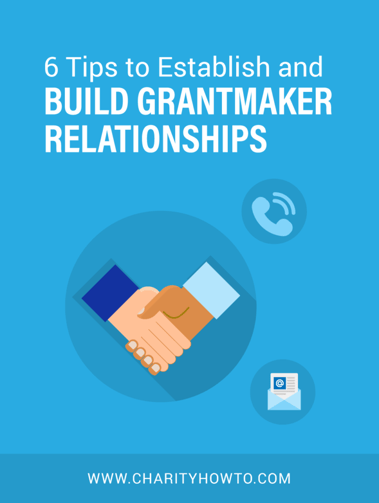“People grant to people, not to proposals.” — Heather Stombaugh, Grant Professionals Association (GPA)

Why Are Grantmaker Relationships so Important?
Relationships with grantmakers have become an integral part of seeking and obtaining grants. While not all grantmakers have the capacity or the desire to communicate with potential grantees prior to making a grant award, you must remember that your funders are humans, too. Your efforts in building authentic, long-term funding relationships and partnerships with grantmakers will make it easier to get grants from your preferred funders now and in the future.
Here are six ways you can establish and solidify relationships with grantmakers before you start on your draft application.
6 Tips for Improving Grantmaker Relationships
1. Humanize your proposal by putting a face to your name.
Before you submit a proposal as an unknown organization or a name on a cover letter, reach out to personalize the process and let the grantmaker know a bit about yourself before you work on an application for submission. This interaction will be the grantmaker’s first impression of the proposal you plan to submit. They may appreciate your efforts to stand out throughout the grant award period.
In the time leading up to the initial contact, you should identify what the grantmaker is looking for in a recipient beforehand and explain to him or her why your attributes align with those desirable qualities. Be sincere in your answers and in all interactions, as each interaction is an opportunity to build trust with the grantmaker. They do not want you to spend time crafting a proposal when they know you will not be a good fit.
2. Learn your grantmaker’s preferred communication style.
Before doing this, however, you should ask the grantmaker about his or her preferred communication style. This will give you a better chance of making a good impression and might even increase your chances of getting the grant. You will also appreciate having a clear framework for building a stronger relationship with the grantmaker. Don’t be shy about asking the person that has made an award to your organization about how they prefer to communicate. For example:
- Do they like to receive phone calls with updates?
- Do they prefer an email with attachments so they can forward them to their colleagues and board members?
- Are they allowed to come to special events for grantees as your guest, or do they need to pay for their own ticket if the participate?
3. Ask clarifying questions and share updates throughout the process.
Connecting with a grantmaker will give you the opportunity to ask questions about their processes or priorities. Having this information may give you a competitive edge, as you can alter your request or proposal language according to the grantmaker’s preferences.
During the process, you shouldn’t wait for a required grant report in order to share a significant update (positive or negative) with your grantmaker. When providing updates during the grant award period outside of formal reporting requirements, be sure to keep your grantmaker’s preferred communication style in mind.
If you aren’t sure what you should share with them, any of the following are appropriate to share.
- A great client success story.
- Outcome measurements that are far exceeding your expectations and the factors around this success.
- You can (and should) share if something isn’t going quite as planned; explain that you need to modify your expected outcomes or extend the time that the grant covers.
- If your updates involve spending any of the money in a different way than agreed upon with the grantmaker, it is your fiduciary responsibility to talk with him or her before making those changes.

4. Always meet your deadlines without exception.
Set internal deadlines for yourself. Stay on top of the finance department to make sure they submit your grant billings. Look over the program department’s shoulder on matters related to submitting midterm or final reports. Do not miss deadlines for any reason. Even when extensions are given or late submissions are still accepted, your funder will remember your tardiness but will likely not remember the situations that brought about the missed deadline.
5. Use social media to publicly express gratitude and reshare relevant funder content.
Saying thank you in the formal IRS letter is required, but it isn’t always enough. You should always go beyond the requirements and by sharing sincere stories of success as a means of saying thank you to a grantmaker for being your partner in a new program, project, or idea. Find ways to express next-level gratitude for your grantmakers in a way that aligns with your own capacity and other grant-related responsibilities.
Social media networks are a great way to express your gratitude in a public and creative way. When appropriate, promote both your grant-funded work as well as your funder’s other work via the social networks in which your grant-seeking organization and your funder are active.
For example, if both parties use Twitter, you can tweet about grant awards, grant project successes, and retweet information about research shared by the funder. If you are both on Facebook, you can share success stories about funded programs with lots of photos, and you can tag the funder and thank them for their part in funding a successful project.
You should even consider resharing your funder’s social content that is applicable to your organization on your organization’s social media platforms. In your organization’s newsletter and on program materials (whether digital or hard copy), you should acknowledge the fact that their funding made the project or program possible.
Try this Free Instant Access On-Demand Webinar Recording: Why Build Relationships with Grantmakers?
6. Discover how you can help the grantmaker achieve their goals in addition to your own.
Although you are seeking grant funds to help your organization achieve its own goals, your potential funder has goals, too. Your grantmaker agreed to fund your organization’s project because they believe your work is aligned with their mission and goals, so you should also be thinking about your grantmaker as a funding partner.
As you think about this, consider how can you help promote your partner within your network and to your stakeholders. Those stakeholders can be board members, fellow staff, social media followers, and so on.
Learn More From CharityHowTo
Following these six grantmaker relationship-building tips as part of your grant-seeking efforts will help increase your grant revenue.
For more information on this or related topics join me for one of my upcoming webinar trainings!

Looking for more detailed relationship advice about Grantmakers for effective organizations? Try this Free Instant Access On-Demand Webinar Recording: Why Build Relationships with Grantmakers?
